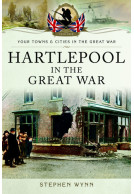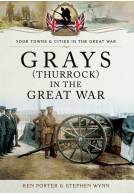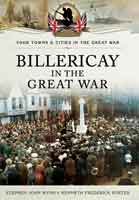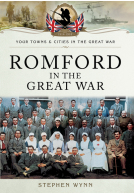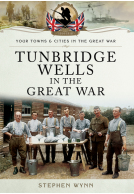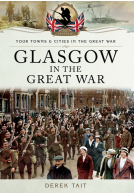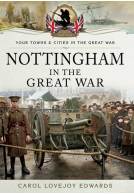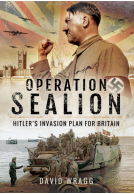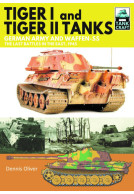Chatham in the Great War (eBook)
Imprint: Pen & Sword Military
Series: Your Towns & Cities in The Great War
File Size: 5.7 MB (.epub)
Pages: 150
Illustrations: 176
ISBN: 9781473864931
Published: 6th January 2017
| Other formats available | Price |
|---|---|
| Chatham in the Great War Paperback Add to Basket | £12.99 |
Chatham played a very important part in the nation's Great War effort. It was one of the British Royal Navy's three 'Manning Ports', with more than a third of the town's ships manned by men allocated to the Chatham Division. The war was only 6 weeks old when Chatham felt the affects of war for the first time. On 22 September 1914, three Royal Naval vessels from the Chatham Division, HMS Aboukir, Cressy and Hogue, were sunk in quick succession by a German submarine, U-9. A total of 1,459 men lost their lives that day, 1,260 of whom were from the Chatham Division. Two months later, on 26 November, the battleship HMS Bulwark exploded and sunk whilst at anchor off of Sheerness on the Kent coast. There was a loss of 736 men, many of whom were from the Chatham area.
On 18 August 1914, Private 6737 Walter Henry Smith, who was nineteen and serving with the 6th Battalion, Middlesex Regiment, became the first person to be killed during wartime Chatham. He was on sentry duty with a colleague, who accidentally dropped his loaded rifle, discharging a bullet that strook Private Smith and killed him.
It wasn't all doom and gloom, however. Winston Churchill, as the First Lord of the Admiralty, visited Chatham early on in the war, on 30 August 1914. On 18 September 1915, two German prisoners of war, Lieutenant Otto Thelen and Lieutenant Hans Keilback, escaped from Donnington Hall in Leicestershire. At first, it was believed they had escaped the country and were on their way back to Germany, but they were re-captured in Chatham four days later.
By the end of the war, Chatham and the men who were stationed there had truly played their part in ensuring a historic Allied victory.
Very good local history. 10/10
The Great War magazine, July 2017 - reviewed by Mark Marsay
The author reminds us that a Royal Dockyard was initially built in the reign of Elizabeth I in 1568 and that during the working lifetime of the shipyard hundreds of vessels were built and launched from here. Because of the perceived threat of invasion or war the seventeen and eighteenth centuries saw the construction of many forts in the Chatham area including Fort Luton, Fort Borstal and Fort Bridgewood. As Wynne says fortunately with Kitchener Barracks, the Royal Marine Barracks, Brompton Artillery Barracks and Melville Barracks there were plenty of places to house the soldiers that were needed to man all the forts.
Duncan Harrington, History Research
The Royal Navy Barracks at Chatham were known as HMS Pembroke, the name taken from one of the naval ships moored at Chatham Dockyards, the other HMS Collingwood. It is interesting to note that the barracks were built on land which had previously been home to an old convict prison and a torpedo factory. There follows accounts of Fort Amherst and Fort Pitt Military Hospital. The author then recounts the sinking of HMS Aboukir, HMS Cressy, HMS Hogue, HMS Bulwark with the numerous loss of life.
There is a very poignant account of the bombing of the Royal Naval Barracks, HMS Pembroke, on the 3 September 1917. Many of the men were sleeping in the drill hall due to an outbreak of cerebrospinal meningitis with a view to preventing the virus spreading. “At 9.30 the same evening five German Gotha G. V. bomber aircraft left their base at Gontrode in Belgium on what was to be their first night flight…As such night raids had not been expected by the British authorities, there was no defensive strategy in place, even anti-aircraft guns not been manned.” Their journey was made easier by all the lights in the towns around Chatham. A direct hit on the drill hall not only sent large shards of glass down on to the sleeping sailors but exploded on impact when it hit the floor. 107 sailors were killed and 86 injured of which 38 subsequently died. The author has found accounts of the aftermath and also the names and resting places of the dead, a truly harrowing account.
On a much lighter note there is a good detailed account of how Sub-Lieutenant Desmond B. Kinahan came to be tarred and feathered by Lieutenant Francis Thomas Wright after ‘he stole’ Wright’s wife whilst Wright was away in Salonika.
Whilst this review has only dipped into this fascinating account by Stephen Wynne I hope that it has inspired you to search out other treasures in the book and purchase a copy.
As featured in
Sittingbourne Messenger
'...what makes the book different, are the many individual stories that Stephen, a former police officer, has managed to quarry – a masterpiece of old-fashioned detective work.'
Medway Messenger
I particularly enjoyed this book!
Julian Stockwin action-adventure historical fiction
Read the full review here.
In 1914 the Royal Navy had three 'Manning Ports, Portsmouth, Plymouth and Chatham, complete with docks, repairs facilities and home port to hundreds of Royal Navy ships. Stephen Wynn's book provides and interesting snapshot of its development and the part it played in the Great War. Chatham was a magnet for German submarines which loitered in the Channel, mine-laying or torpedoing RN vessels and it suffered air attacks which incurred heavy casualties amongst the RN personnel. The book is well indexed and supported by photographs.
Richard Gough - Military Author and historian
About Stephen Wynn
Stephen is a retired police officer having served with Essex Police as a constable for thirty years between 1983 and 2013. He is married to Tanya and has two sons, Luke and Ross, and a daughter, Aimee.
When not writing, Stephen can be found walking his four dogs with his wife Tanya at some unearthly time of the morning, when most normal people are still fast asleep.








